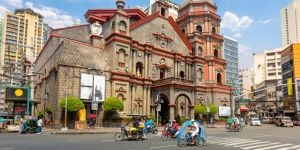Foreigner 25 year lease
Subscribe to the topic
Post new topic
@Calif-Native
Reading through your elucidatory analysis of Filipino law brings me back to a book I was tasked with reading for my English Literature A - Level exam: Bleak House penned by the great 19th century English writer Charles Dickens.
A damning indictment of how the legal profession will bleed you dry of opaque areas of law that lend themselves to various interpretations. Throw in a corrupt artery that runs through the Philippines judicial body and it should be a stark warning to existing and potential expats on this Forum considering any conjugal relationship or financial investment in the Philippines.
-@Lotus Eater
One ahould know in advance if he can trust his Filipina married spouse. A great many of us live on a house with lot here but we stayed together for many years in the home country in a house there, put our kids through college in the US and just want to retire here. In those situations there is only low, low risk. On the other hand, you meet some scammer online and pay for a house and lot so you can build your perfect love nest till the end of time, well then you are stupid and your lack of respect for wealth is the reason you deserve to lose it. Legal matters are a secondary consideration.
OP Dennbis52 said . . . .Has anyone had experience in seeking a 25 year lease agreement. My friend purchased a property here in his fiancé’s name and needs to protect himself. Thanks
*******************************
It's already too late for your friend looking for options as he has purchased the property. The real question why did he dive headlong into this situation?
What was his motivation?
Senior Expats make poor decisions involving love or relationships. Your friend actually needed to protect himself from himself. He or anyone else should know the rules of the game prior not afterwards.
Agree Bob. Know your sh1t before diving in, leases need to be accomplished at arms length and water tight. Leasing from a fiancé is tant amount to tears.
It can be as simple as approaching a third person unrelated selling a property and negotiate a lease, offer 50 to 75% of the asking price for the lease, pay them for 25/50 years in advance and they still own the land for their heirs. Most of the cash up front for them. Legal.
OMO.
Cheers, Steve.
@Lotus Eater - Your post made me laugh! truly, an analysis without a NMR spectroscopy.......
@Lotus Eater - Your post made me laugh! truly, an analysis without a NMR spectroscopy.......
-@Calif-Native
I think that whether you analyze it technically or in the verbose, if one finds himself in a situation where he thinks he may need to protect his investment, that is enough of a red flag. Don't do it.
Or do it and protect your investment/s legally, nothing less. Procrastination lost many good deals.
Cheers, Steve.
Or do it and protect your investment/s legally, nothing less. Procrastination lost many good deals.
Cheers, Steve.
-@bigpearl
Your biggest investment is emotional, your spouse or partner that you would be doing this with. If you think there is even a slight possibility that you need to protect against a possible financial betrayal from that person, that is a red flag to not invest, period.
Dan 12 years on and we are still together, Ben understands why I did it this way as I have kids (heirs) as well as him. The protection is reality when it comes to some of his family, I went through this when my ex wife and I divorced after 22 years, she simply said we split everything 50/50 I disagreed and offered her 60% as she would have the kids as well as us agreeing on the maintenance figure.
I worked on a job O/S for 5 months and when I got back to Oz she said that talking with her family she now wants 75% I told her I'll see her in court, we settled out of court at the agreed 60%
Here is very different, the legal and court system favors the Filipino and not the foreigner, protection and realism is mandatory in my opinion.
Remember this is a lease, Ben already owns the land.
Cheers, Steve,
@Dennis52
I hope you are well.
I have a 25 years lease and I built a house 2 years ago. Total cost for the lot 75m2 was 1.2 M and cost of building 2 storey house is 4.8 M. The lease is under my GF name. The building is solely under my name with water and electricity bills also under my name. The building tax is also under my name.
My relationship with GF is up and down. I take risk of losing if relationship collapsed. Go ahead if you are willing to take similar risk like me . Life is full of surprises, and your fried today is your opponent tomorrow. Be prepare to fight tomorrow whom you have a good relationship with TODAY. of course there are exceptions to this situation.
Good luck.
OMG!!! now I am even more afraid to move there, my family said they would sell me a piece of their land but if something were to happen to them I'm "SOL".
@Calif-Native
If Owned assets automatically become Conjugal property, at marriage, is it safe to say that a property previously leased from "other than the future spouse", and said house built on that land, is protected from the "impending marriage implied joint-ownership" if a pre-nupt indicates that the house built prior to the marriage remains as sole property of the expat, as long as the lease exists?
Also, in regards to the 25+25 year lease arrangement, is there any way to automatically extend the 2nd 25 year period?
Thanks in advance
@muskegonconsulting
One of the keys to the land lease and structure ownership will be based on the wording used in the lease and the recording of said terms at the registrar's and tax offices.
I am not providing legal advice here.
I am sharing similar wording that I developed and used in a land lease here in the PI. Once the lessor and lessee are married, the lease is void under the law here. Land to a foreigner is not able to be conjugal property since 1935.
One could consider a lease that reads:
"The Filipino lessor and foreign lessee agree that any/all structures placed on lot # _______ under TCT ________, are now and will remain the sole property of the foreign lessee with rights of survivorship to foreign lessee's property per Stirpes. It is further agreed that the lessee has exclusive rights to change, add, remove or sell any of the lessee's legally owned structures and to extend the 25 year lease for another 25 years, when this intention is confirmed in writing, between the 7th -10th month of the 24th year of the initial lease." "Both parties agree and further confirm that this lease shall survive either lessor and or lessee, with the lessee's survivor being identified herein as Ms. ______. __________."
"Lastly, both parties agree that this agreement will be both recorded and used as the basis for registration at the local Tax office, where any structure based and or lot improvement TAX Declarations (TD's) are to be issued. This agreement is the legal basis for the issuance of said TD(s) to be in the lessee's name only."
There are important legal points and dates in an agreement like this that should be followed to avoid the claim of "constructive control" of land by a foreigner in a Philippine court. Good Luck!
@ Calif-Native
Wise and experienced words as always.
I set up a long term lease 5 years ago with my same sex partner, one of the stipulations was that the title be encumbered by the lease, like a mortgage. First Attorney forgot and the clean title in my better half's name with no mention of a long term lease, pursued this with another mouth piece, he said as I am not a lending institution I can't hold a mortgage on the property, no I told him a simple encumbrance and 3 years later the new encumbered title, released on my say so or in case of my demise my executors wishes.
The laws and understandings here are at times slow and other times verging on arcade.
OMO.
Cheers, Steve.
@bigpearl
I am sure your situation represented "untraveled territory" for the legal profession here. You were on target to already know how it should have been prepared, prior to engaging the person that still ignored your needs.
It has been my limited experience here that nearly all of the legal professional here are intent to follow the easy path and seem to think foreigners (especially Kanos) are not familiar with the laws. I faced this issue here and had to remind the legal professional of the long standing Weems v. United States, 217 U.S. 349 (1910) case. This established by case law in 1909/1910 that a "A paramount governmental authority may make use of subordinate governmental instruments without the creation of a distinct legal entity, as is the case of the United States and the United States Government of the Philippine Islands". The court held that Weems conviction was reversed, and that, "as a soldier, he was not an official of the Philippines, but of the United States."
This case was quoted in the 2023 case of ANDRE VERDUN, et al., v. CITY OF SAN DIEGO, CALIFORNIA, et al., in a "Petition for a Writ of Certiorari to the U.S. Court of Appeals for the Ninth Circuit".
Why has the PI borrowed laws from other countries?
It is allowed via the constitution: "Article II s 2 of the Philippines Constitution provides for the 'incorporation' of the norms and principles of international law by stating '[t]he Philippines . . . adopts the generally accepted principles of international law as part of the law of the land."
Why is this important for expats living here?
Expats living here should understand how evidence is collected and presented in courts here. This includes evidence of how a foreigner is able to prove certain rights under Philippine laws on property rights (not to be confused with land ownership). Any person that had a few law courses in California during the 70's and 80's learned that the "Evidentiary Rules" in the Philippines concerning confessions and witness disqualification, are a cut-n-paste of the rules applied in the State of California. Fast forward to 2023, we find that most court rules in the Philippines are broader and based on a representative mix of Roman (civil law) and Anglo-American (common law) systems, and now Islamic law.
Since I have found that so many bar card caring individuals here in the PI remain clueless on the origins of the laws they claim to practice, I suggest that expats consider researching the topic they need help with and be better prepared to catch/prevent persons from the Brgy to local attorneys failing to stay on point.
@Calif-Native
Yes probably right "untraveled law/inexperience or sheer laziness" led to oh, sorry I forgot.
Any way twas a bit of a fight but the second Attorney managed in the end and now in the safe sits the encumbered title, OMO but worth pursuing with regards to a long term lease and a semblance of security.
Cheers, Steve.
@danfinn
I'm going slightly off topic here but....... I will link it and make it worth your read.
In 2019, I returned to California with plans to purchase an Ocean view lot and have my wife be on title. I purchased a lot in Northern California (Shelter Cove), where many of my wife's friends "advised" her that it was impossible for her to be a land owner in California, when she had never been to the USA.
Since I was fully aware that California has 8 ways to hold title, and US Citizenship or Residency is not a requirement, I selected the title type known as "CPWROS" (i.e., Community Property With Right Of Survivorship), and closed escrow early 2019.
Key Point 1 - The right of survivorship title in California states "that when one spouse dies, the title and ownership will remain with the living spouse instead of being passed on to their children."
Having no idea I would loose my wife in late 2020, this past decision/preparation means I am now able to remove her from title by merely presenting her death certificate. This also means there will be no Court probate or reassessment of the tax base, due to change of ownership.
For person not married in California, the "JTWROS" (i.e., Joint tenancy with right of survivorship) would be a good option to consider.
Why share the above here in this forum?
Some expats may have plans that include immigrating their spouses to the USA. Since most of us are a "few months" older than our filipino spouses, there is a higher probability that we may pass before them. Additionally, certain Visa applications can take on a newer/faster tracking when the filipino is a legal land owner in the USA. The U.S. laws vary by state on how title can be held and is very, very different than holding title to a structure here in the PI. Each expat needs to research/review their home state, should eventual relocation to the U.S. is an option.
Fiction - Many locals assume property entitlements are the same as they are here in the PI; where the kids auto inherit percentages. A few friends here voiced concern that should they move to the USA and their Kano passes, their house and property will automatically go the adult kids of the expat. That is generally not the case in the USA and our spouses need to be clearly instructed on this and/or be guided beforehand, by our Wills and the selection of that State's property title types.
Key Point 2 - This is also a time for us to review/update any Last Will & Testiment documents previously executed, that may be outdated or in conflict with our newest status.
I believe it to be wise to prepare for this eventuality by not having our spouses trying to navigate post-death property adjudication in our particular U.S. State. As expats navigate the property rights here in the PI (and learn how to protect these rights), it may be a good time to address what we want or have in our home country and how we want to protect these properties back in the USA; that form part of the expat's total estate.
How can this assist with removing resistance to an expat being the owner of a structure here in the PI? - A few years ago, I assisted an expat that wanted to have ownership on the house he was to build on the GF's lot. There was great resistance (reportedly due to her family concerns). When I was asked to get involved, the topic of a "reciprocal" agreement was explained/explored, the "temperature" changed when she was made aware that even after marriage, he could refuse to grant her part ownership in his U.S. property, and keep it as him having "sole ownership", based on his State's laws. Some may consider this to be reciprocity at it's best... what are your thoughts?
Moving forward - With a new wife and 7 month old baby here in 2023, our plans to raise our child in California, have already dictated my last will and testament content. Note: Even with my main residency being in California, as an SRRV holder, the small yearly fee to retain it will allow for uncomplicated annual returns to the Tagaytay residence.
Expats from other western countries may want to also look into how they can best protect their spouse/dependents upon their passing; while residing or holding property in their home country.
Articles to help you in your expat project in the Philippines
 Getting married in the Philippines
Getting married in the PhilippinesGetting married in the Philippines provides a backdrop of immense beauty through stunning beaches, tropical ...
 Retire in the Philippines
Retire in the PhilippinesRetiring in the Philippines can be an exciting prospect for expats. Settling down in the Philippines has its ...
 Traveling to the Philippines
Traveling to the PhilippinesDo you need a visa and other requirements to travel to the Philippines? Here is your step-by-step guide for entry ...
 Lifestyle in the Philippines
Lifestyle in the PhilippinesAbout to move to the Philippines? Wondering how you're going to adapt to your new environment and lifestyle? ...
 Dating in the Philippines
Dating in the PhilippinesThe beauty of the Philippines, with its dramatic modern and old Spanish architecture, plus the golden sands and ...
 Obtaining a Philippines driving licence
Obtaining a Philippines driving licenceWhether you are converting your existing foreign driving license or applying as a first-timer for a Philippines ...
 Leisure activities in the Philippines
Leisure activities in the PhilippinesConsisting of more than 7,000 islands, the Philippines is a real treasure that you can explore during your stay ...
 Choosing your neighbourhood in Manila
Choosing your neighbourhood in ManilaChoosing a neighborhood is one of the most critical decisions that expats need to make when moving to Manila. Each ...
Find more topics on the Philippines forum



